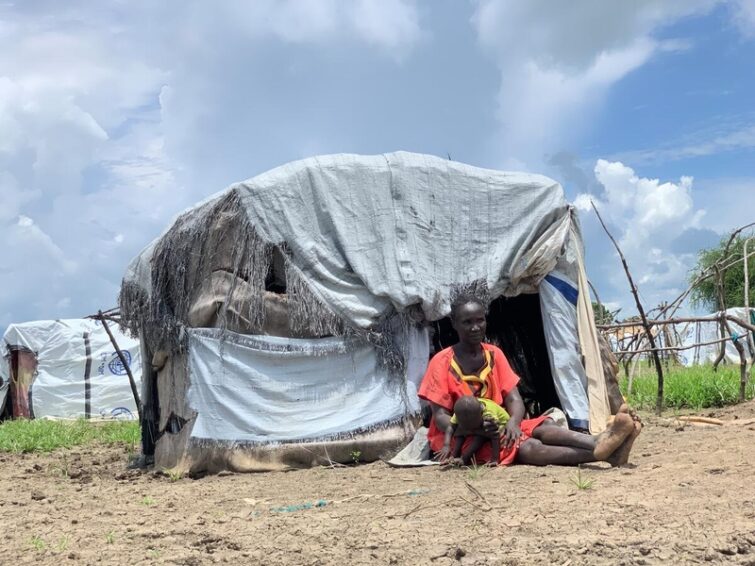You won’t find the term “refugee” in the Bible. But the Word of God has plenty to say about people called “strangers” and “sojourners” or “foreigners” in our translations.
“Strangers” and “foreigners” refer to anybody who lived among the Jews but was from another ethnic group — no matter what category they might represent in today’s terms.
For instance, the book of Ruth is about a widow from the tribe of Moab who chooses to accompany her mother-in-law, Naomi, back to Israel and live there with her. In Ruth 2:10, we see her ask Boaz, in whose field she is gleaning, “Why have I found such favor in your eyes that you notice me — a foreigner?” She understands her status as being outside the tribe of Israel.
“Sojourners” are people who are temporarily living in Israel or traveling through the country.

Today’s strangers, foreigners, and sojourners
We use many different terms today for what the Bible calls strangers, foreigners, and sojourners. Here are a few:
- Refugees — individuals who have fled their home country due to a well-founded fear of persecution, war, violence, or serious harm to their life, physical well-being, or freedom. When someone meets the criteria of a refugee, they are entitled under international law to protection and assistance. In many cases, the circumstances that force families to flee their homes are ongoing crises that make it unsafe for them to return for many years — or leave them without a home to return to — resulting in prolonged displacement.
- Asylum seekers — anyone who seeks international protection due to persecution or harm in their home country. Every refugee was initially an asylum-seeker, so when this term is used, it is often meant to indicate someone who is seeking but has not yet been officially granted refugee status by a host country. When an individual applies for asylum, the host country’s government evaluates the claim and determines if the individual meets the criteria for refugee status under international law. If so, they are then formally recognized as a refugee and granted the according protections. If denied, they may be required to leave the country they sought refuge in.
- Internally displaced people (IDPs) — individuals who have been forced to flee their home but have not crossed an international border to seek protection. IDPs are like refugees in that they have been uprooted from their homes due to natural disasters, conflict, persecution, or other threats of harm. However, IDPs remain within their country of origin, often living in temporary shelters, in camps, or with host families. IDPs typically return home if it becomes safe and feasible to do so.
- Migrants — those who have chosen to leave their home country, mainly to overcome poverty. Migrants are making a permanent move to reunite with family or improve their conditions by pursuing work or education opportunities and would not return to their home country unless conditions improved significantly.
- Immigrants — people who choose to move to another country for any number of reasons, such as marriage or other family ties, employment, or business opportunities. The term “immigrants” encompasses a broad range of people, while “migrants” specifically refers to people who move to escape poverty.
- Stateless people — those who are not citizens under the laws of any country. A person can experience statelessness when a country ceases to exist or when a country adopts discriminatory laws that do not recognize certain ethnic groups within its borders.
There are principles in God’s Word about how His people are to treat strangers, foreigners, and sojourners.
Share the story of Jesus.

Jesus said we should show disciple-like behavior in how we treat “strangers.”
“I was a stranger and you invited me in.”—Matthew 25:35 (NIV)
Middle Eastern cultures have always been famous for their hospitality. For example, Abraham invited the angelic visitors into his tent and provided a lavish meal for them (Genesis 18:1–8). Even so, strangers among the different tribal groups were looked at with suspicion, often conned or taken advantage of, and generally mistreated, especially if they were poor. Against this cultural backdrop, God’s directives in the Old Testament are counter-cultural.
Jesus builds upon the Old Testament precedent and takes it a step further by emphasizing that how we treat strangers indicates whether we are His followers. As His disciples, we are to invite the stranger in.
Foreigners or refugees are not to be oppressed.
“Do not oppress a foreigner; you yourselves know how it feels to be foreigners, because you were foreigners in Egypt.”—Exodus 23:9 (NIV)
The principle here is clear: Honor the dignity and humanity of foreigners. Notice that the Scripture gives Israel a reason why: because they knew how it felt to be foreigners. Israelites were to call on their empathy for refugees because they had been treated cruelly as refugees when they were made into slaves in Egypt. They were instructed not to cheat foreigners or take advantage of them in any way.
Treat foreigners or refugees as citizens — and with love.
“The foreigner residing among you must be treated as your native-born. Love them as yourself, for you were foreigners in Egypt. I am the Lord your God.”—Leviticus 19:34 (NIV)
When we look at what God says about war and conflict, the Bible reflects its harsh realities, but it also reveals God’s heart for peace. Most Christians know Jesus’ instruction to “love your neighbor as yourself” but may not be aware that Mosaic Law has the same instruction for how to treat foreigners. The command to treat them as “native-born” would have been shocking to people in Moses’ day.
Historically and currently, displaced people may live away from their homes for a short period or even many years. By 2024, nearly 120 million people have been forcibly displaced from their homes, according to the U.N. Refugee Agency.
This instruction in Leviticus is as relevant now as ever before.
God has set a high standard for treating those who are foreigners. His people are to love them like we love ourselves and to treat them as citizens. And the reason given? Because God — the I Am — commands it.
Make foreigners part of the community.
Miscellaneous instructions in the Law of Moses — the first five books of the Bible — made sure foreigners were included in the Jewish community. They included provisions for them to be treated equally under the law and to be included in festivals and celebrations of the community.
- Cities of refuge were available to Israelites and foreigners in cases of accidental killing (Numbers 35:15).
- Foreigners were to be included in festivals and celebrations mandated in the Law (Deuteronomy 16:14; 26:11).
- Some of the tithes collected by the priests were to be used to not only feed them and their families, but also to help provide food for foreigners, widows, and orphans (Deuteronomy 14:28–29).
- Farmers were instructed to leave the gleanings of their fields for the poor and the foreigner (Leviticus 23:22).
- The command to care for the stranger was so embedded in the Law that it was used as the basis for how God’s people were to treat each other: Israelites were to treat their own poor as they would the stranger or the foreigner (Leviticus 25:35).
Notice how these verses address the importance of meeting the needs of displaced people, particularly with regard to food. What needs would someone have coming to the U.S. with a prearranged job as a research scientist in a pharmaceutical lab? How about someone from Ukraine who lost their business and home and sought refuge in Poland? The inequalities are striking. God’s people are called to help meet needs for those struggling with access to food and a means of income, sparing them the devastating effects of extreme poverty and hunger.

Show hospitality to strangers.
Keep on loving one another as brothers and sisters. Do not forget to show hospitality to strangers, for by so doing some people have shown hospitality to angels without knowing it. —Hebrews 13:1-2 (NIV)
In this passage and a few others (Romans 12:13; 1 Peter 4:9; 3 John 1:5–8), the habit of showing hospitality is highlighted as a characteristic of those who follow Jesus. The church is to support one another, including strangers who come to worship. This became especially important once the Jews were forced from Jerusalem and Palestine in 70 A.D. by the Romans. Then and now, the church should be a welcoming community to all.
All believers are strangers on earth.
… live out your time as foreigners here with reverent fear.—1 Peter 1:17 (NIV)
This is a principle for God’s people of all times. Moses instructed the Israelites not to sell any of the land permanently, because the land belonged to God and they were only foreigners living there (Leviticus 25:23).
Think of how graciously God treats us, the foreigners living in His world. His kindness to us can guide our thoughts and actions toward those living as strangers among us.
All believers in Jesus Christ belong to the kingdom of God.
Consequently, you are no longer foreigners and strangers, but fellow citizens with God’s people and also members of his household. —Ephesians 2:19 (NIV)
This verse follows the great passage in Ephesians that lays out how we have been saved by grace through faith in Jesus (2:8–10). The terms “foreigners” and “strangers” are used here as metaphors for our condition before our faith in Jesus Christ. Before we believed, we were outside the covenant and considered foreigners or strangers in God’s kingdom (2:11–13). But because of our faith in Him, we are now part of God’s community — strangers who have been welcomed in.
Most people can relate to feeling like an outsider at some point in their lives — whether it be due to their race, ethnicity, economic status, religion, nationality, gender, or other factors. For believers, this feeling can be an opportunity for solidarity with the displaced and marginalized — especially when we recognize that we too were once strangers to God’s kingdom but were welcomed in through the grace and mercy of Christ. In this way, the biblical commandment to welcome strangers becomes a powerful expression of our shared humanity and a reflection of the divine love that transcends all boundaries.






